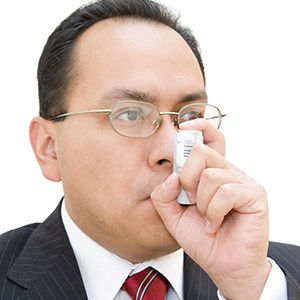
If you have severe breathing problems, you may be unable to perform duties associated with full-time employment. But is asthma a disability? The short answer is, it depends. Diagnosis and treatment should be well-documented, and also include medical evidence from a qualified medical professional. To learn more, speak to a long-term disability lawyer at CJ Henry Law Firm today.
CPI is a category of progressive lung diseases and includes emphysema, non-reversible (refractory) asthma, chronic bronchitis, and some forms of bronchiectasis. Chronic obstructive pulmonary disease (COPD) falls under this category of disorders.
Common breathing difficulties associated with these disorders are coughing and wheezing, as well as shortness of breath. Many COPD sufferers also experience a reduction in their breathing capacity because there is an obstruction of airflow in and out of the lungs. Smoking is the most common cause of chronic obstructive pulmonary disease.
Stabilization or resolution of symptoms depends on smoking cessation. If you quit smoking, this will also strengthen your disability claim because it demonstrates to your insurance company your dedication to improving your condition.
Physicians usually diagnose COPD using spirometry, a breathing test, which measures the amount of air you inhale and exhale over a pre-determined period. Both pre and post-bronchodilator spirometry tests can be used for the initial diagnosis of asthma. These tests must be accompanied by a review of the patient’s medical history as well as a complete physical exam.
CF is a genetic, life-threatening breathing disorder. It manifests by thick mucus in the lungs, liver, kidneys, pancreas and other areas of the body. Cystic Fibrosis symptoms include shortness of breath, persistent coughing, pulmonary hypertension (high blood pressure that constricts arteries), and frequent lung infections.
Is asthma a disability? If your condition meets the following criteria, the answer is yes. Acute asthma is defined as an attack in which symptoms last at least one day and requires treatment or attacks which need treatment by a doctor or hospitalization at least once in two months.
In addition to the frequency of attacks, your asthma must significantly inhibit your daily activities and your ability to perform work. These symptoms indicate your asthma is a disability and qualifies for long-term benefits.
Emphysema is damage to lung tissue typically caused by smoking. The disease may affect only the upper portion of the lung lobes or all lung areas. A chronic cough, productive or unproductive, and shortness of breath are the most common symptom of this disease. As with other breathing disorders, you must prove the extent to which your daily activities are limited because of the condition.
You may not be as familiar with RLD as with other breathing diseases such as COPD or asthma. RLD prevents the proper exchange of gases in the lungs which leads to insufficient oxygen. There are viral and bacterial causes as well as environmental causes such as exposure to asbestos or radiation.
Stroke patients often experience breathing difficulties during recovery. These breathing difficulties may be severe enough to qualify to long-term benefits. Qualification is determined by lung capacity tests and effects on daily activities.
The breathing disorders above are not all-inclusive but are representative of the types of pulmonary diseases which qualify for long-term disability.
Insurance adjusters reviewing respiratory claims are looking for the applicant’s ability to perform full-time work, referred to as your residual functional capacity or RFC. The determination is based on your physical and mental capabilities, not your physical and mental deficiencies, as a result of your respiratory disease. So keep that in mind as you prepare your long-term disability claim.
CJ Henry Law Firm can answer your questions about breathing disabilities and benefits. Contact us today to learn more.

Attorney Henry is a Florida disability lawyer Florida disability lawyer uniquely suited to help you
with your disability-related legal needs...Protect Your Benefits Today (352) 577-7746